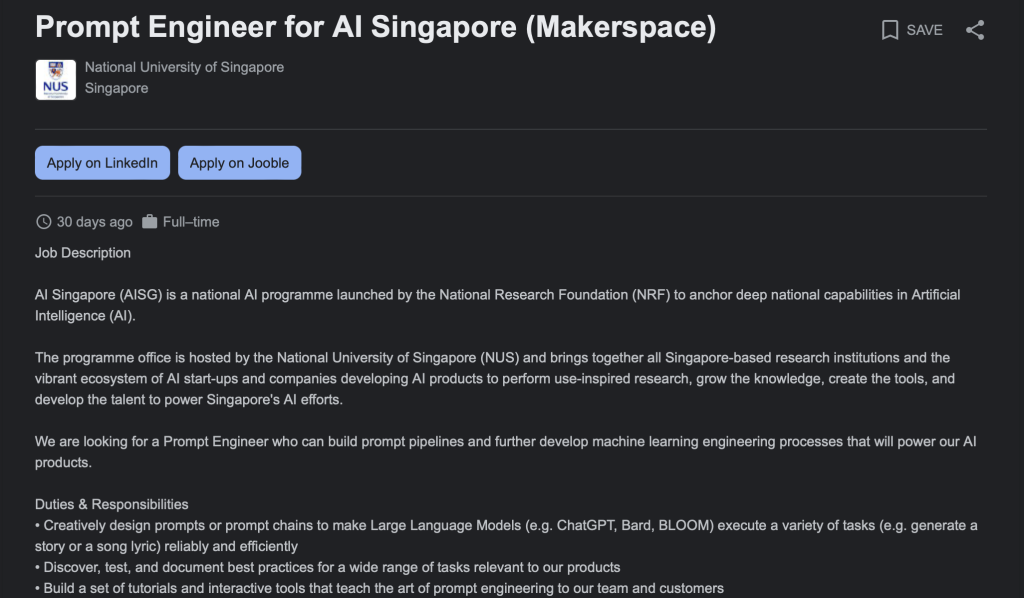Artificial intelligence (AI) tools have been making headlines since the arrival of ChatGPT November last year. OpenAI’s brainchild ChatGPT has sparked an AI arms race that is causing an unprecedented growth in the industry, as more companies dash to put out their own AI tools such as Google’s Bard and Baidu’s Ernie Bot.
However, the advancement of AI has triggered waves of fear and uncertainty, particularly regarding the tech’s potential to replace human jobs.
As countless articles forewarn us about the imminent demise of numerous jobs at the hands of AI — 300 million full-time jobs, in fact — what’s overlooked amongst these alarmist narratives is the fact that AI is actually a prolific generator of new jobs.
One such job that has emerged in the wake of AI’s progression is an AI “prompt engineer”. Their primary responsibility is to create and curate prompts. In other words, the input, or what you command the AI bot to do, that guide the AI’s responses and behaviour.
Like typical high-paying tech jobs, AI prompt engineers can earn an upwards of US$335,000 (S$445,000) per annum in the United States — yet, surprisingly, a computer engineering or STEM degree isn’t necessarily a pre-requisite for this role.
Instead, the role requires strong linguistic skills that can command AI models — be it ChatGPT, BARD, or Bing — in producing more accurate, coherent, and contextually appropriate responses.
AI prompt engineer jobs in Singapore
Considering that Singapore places a high emphasis on the development of AI, it comes as no surprise that the prompt engineer role is also in demand in the city-state. After all, the AI market in Singapore is projected to reach US$16 billion (S$21.49 billion) by 2030.
Several prominent companies, including Hepmil (the parent company of SGAG) and ERA Real Estate, have already embraced conversational AI as a means to automate multiple processes, ranging from email generation to image creation.
Even the Singapore government is currently in the works of integrating ChatGPT into Microsoft Word, aiming to “free [civil] officers up for higher-level tasks”.
By automating easily accomplished tasks, valuable human resources can now be redirected towards other duties, making prompt engineering a highly sought after skill.
Merely a month ago, the National University of Singapore (NUS) posted a hiring call seeking for prompt engineers. The job description provided by NUS highlights the responsibilities of crafting innovative prompts or prompt chains to harness the potential of large language models such as ChatGPT and BARD to execute a wide array of tasks efficiently, including generating stories and song lyrics.

While salaries in the United States can reach up to six figures, the salaries offered by Singaporean companies are more modest. For instance, NUS is offering a pay of up to S$96,000 per annum for the role.
Instead of recruiting dedicated prompt engineers, some companies are exploring alternative approaches by expanding the responsibilities of their existing employees and engineers. By doing so, they get to save on additional hiring costs.
For instance, co-living company HomeyDays posted a hiring call for a Sales/Operations Manager who can effectively leverage the tech to streamline and simplify various tasks.
Bridging the gap between human expectations and AI responses
At this point, you may be wondering why organisations are seeking to hire prompt engineers, despite the abundance and accessibility of freely available AI chatbots. Anyone, and everyone, can become a decent writer, illustrator and animator overnight.
However, the reality is that achieving accurate and desired responses from these AI tools can be very challenging.
Despite its capabilities, AI cannot read your mind. It requires careful prompt engineering, refining, and fine-tuning to optimise outputs. This is why crafting effective prompts and providing clear instructions are crucial to obtaining the desired responses from AI models, which requires expertise and significant effort.
As a matter of fact, due to the challenges associated in coming up with good prompts, online marketplaces such as Promptbase have emerged, where prompt engineers can sell their meticulously crafted instructions specifically tailored for different AI tools such as DALL-E and Midjourney.
AI prompt engineers essentially act as intermediaries, possessing the skillset to bridge the gap between human expectations and AI responses. The value that you obtain from these AI tools solely depend on the effectiveness of your prompt.
Furthermore, prompts need to be curated to suit different AI models in order to achieve optimal results. AI models are designed with specific architectures and trained on specific types of data, which means they may have varying strengths, limitations, and preferred input formats.
As a result, crafting prompts that align with the capabilities and requirements of a particular AI model is essential to elicit desired responses, which further highlights the need for AI prompt engineers.
Will the demand for AI prompt engineers last?
While some may argue that the demand for prompt engineers may gradually diminish as generative AI continues to advance, these engineers will still play a critical role in ensuring that these models provide the best outputs.
While the eventual goal for AI systems is to become more intuitive and capable of generating desired outputs with minimal input, they would still require guidance and direction to ensure that their outputs align with human expectations.
Moreover, different AI models have their own architectures, training data, and preferred input formats. Prompt engineers understand these nuances and can curate prompts specifically tailored to each model to achieve optimal outcomes.
They can leverage their knowledge and skills to explore the full potential of generative AI, uncovering new applications and use cases beyond what the models can achieve independently.
Therefore, as the need for prompt engineers may evolve as the tech progresses, their role in shaping and optimising the outputs of generative AI models is likely to remain relevant and valuable.
Featured Image Credit: Getty Images